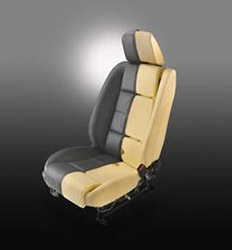Jun 30 2009
Ford Motor Company’s commitment to being a ‘green’ automaker goes beyond improving fuel economy and reducing carbon emissions. Ford also is leading the industry in its award-winning use of environmentally friendly, soy-based foam in seat backs and cushions.
 Soy based foam seat
Soy based foam seat
Ford’s innovative use of this renewable bio-material has earned several prestigious awards, including winning the “Environmental” category at the recent 2008 Innovation Awards competition sponsored by the Society of Plastic Engineers (SPE) Automotive Division. The honor is shared with supplier Lear Corp. Ford dominated the recent event by winning four of eight categories as well as the top vehicle award for the most innovative uses of plastics on one vehicle, the 2009 Ford Flex.
“This is a fantastic example of a domestic automaker and its supplier looking beyond current sustainability solutions,” said Maria Ciliberti, SPE awards program chair and global automotive director for Ticona Engineering Polymers, a leading global supplier of engineering thermoplastics. “I would like to see Ford and Lear’s soy foam innovation implemented across the auto industry.”
Ford was the first automaker to demonstrate that soy-based foams could be formulated to pass stringent requirements for automotive applications. In August 2007, it introduced soy foam seats on the 2008 Ford Mustang, and has since placed soy foam seats in the Ford Expedition, F-150, Escape and Focus, as well as Mercury Mariner, Lincoln Navigator and Mazda Tribute. By the end of the 2009 model year, more than one million Ford vehicles will contain soy foam.
“As Ford continues to increase its use of soy-based foam seats across many vehicle platforms, we’re reducing our environmental footprint by reducing carbon dioxide emissions, decreasing dependence on oil and moving toward sustainability,” said Jerry Brown, Ford seat systems chief engineer.
With soy foam in seats on one million vehicles, Ford expects to decrease its use of petroleum oil by one million pounds and reduce its carbon dioxide emissions by five million pounds annually. Use of soy foam in seats also delivers superior product performance, and supports American farmers.
Todd Allen, Arkansas soybean farmer and chair of the United Soybean Board’s New Uses Committee, called Ford’s innovative use of soy foam a “huge success.” USB oversees the crop-related investments of all U.S. soybean farmers and works closely with companies throughout industry, including Ford, in an effort to get soy-based technology commercialized.
“Having this technology recognized by industry experts with this Innovation Award demonstrates the quality of product that can be developed using U.S. soybeans,” Allen said.
According to the National Institute of Standards and Technology, soy-based products have only one-quarter of the level of total environmental impact of petroleum-based products. Most automakers today use 100 percent petroleum-based polyol foam. Each vehicle contains an average of 30 pounds of petroleum-based foam in its seat backs, seat cushions, armrests, instrument panels and headliners.
“We are very excited to be the first auto manufacturer to implement bio-based foam on production vehicles,” said Cynthia Flanigan, Ford plastics technical expert. “And we are moving forward to develop a portfolio of other sustainable materials that will go into future Ford vehicles.”
Ash Galbreath, Lear Corporation director of advanced material said: “This recognition of Lear Corporation’s first-to-market SoyFoam™ technology is confirmation of the environmental product leadership position Lear has worked hard to develop over the past few years. We are proud of the success of our partnership with Ford Motor Company and continue to improve seating systems’ environmental footprint and innovate weight reduction, renewable content, recyclable and other ‘green’ product solutions.”
Ford Dominates SPE Awards
SPE also bestowed its top Vehicle Engineering Team Award to the new Ford Flex for its innovative use of plastics. In addition, Ford topped the Body Exteriors category with its integrated rocker molding/running boards on the Ford Escape; the Safety category with its foam head impact protection in the headliner of the Ford Focus, and the Body Interiors category with its integrated floor shifter/console in the Flex.
Headquartered in Brookfield, Conn., the SPE promotes the innovative use of plastics. It has 20,000 members in more than 70 countries around the world.